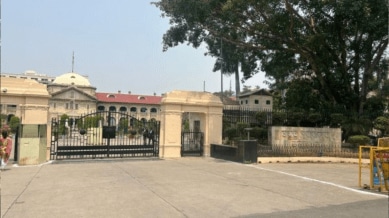Stay updated with the latest - Click here to follow us on Instagram
‘Delicate task, needs expertise’: Allahabad HC lays out rules for assessing juveniles in heinous crime cases
The court noted that while Section 15 (1) of the JJ Act provides for a preliminary assessment of the child in conflict with law, the process of determination has not been provided anywhere.

Allahabad High Court: In a significant ruling, the Allahabad High Court has issued fresh guidelines to be followed while carrying out a preliminary assessment of juveniles accused of heinous crimes.
It said these guidelines are to be followed by the Juvenile Justice Board (JJB) and children’s court while carrying out the assessment — under Section 15 of the Juvenile Justice (JJ) Act, 2015 — particularly in cases involving serious offences such as murder before determining if juveniles should stand trial as an adult.
monthly limit of free stories.
with an Express account.
Section 15 mandates a preliminary assessment be carried out for minor children accused in heinous crimes to determine their Intelligence Quotient and Emotional Intelligence Quotient.
The HC was hearing a criminal revision petition filed by a juvenile, who is facing charges of murder, conspiracy and assault, challenging the decisions of the POCSO Court and JJ Board issued in 2023 and 2020 respectively. The orders had held that he should face trial as an adult.
Quashing these orders, the bench of Justice Siddharth observed, “The provisions of Section 15 (1) of the Juvenile Justice (Care and Protection of Children) Act, 2015, are absolutely vague. Although preliminary assessment of the child in conflict with law is provided in the aforesaid section with the help of psychologists or psycho-social workers or other experts, the process of determination has not been provided anywhere.”
The court also observed that Rule 10 A of the Juvenile Justice (Care and Protection of Children) Model Rules, 2016, provides that the JJ Board may take the assistance of psychologists, psycho-social workers or other experts who have experience of working with children in difficult circumstances. It further provides that a panel of such experts may be made available by the District Child Protection Unit, whose assistance can be taken by the Board or could be accessed independently.
The court also referred to Rule 11 (2), which provides that before passing an order of preliminary assessment, the Board shall obtain a social investigation report prepared by the probation officer, child welfare officer or social worker as ordered and take the findings of the report into account.
The court further stated that there is nothing in the aforesaid provisions as to how preliminary assessment of a child should be made by psychologists to help the Board/Court.
In its observation, the court stated the explanation to Section 15 of the JJ Act clarifies that the preliminary assessment is not a trial but an exercise to assess the child’s capacity to commit and understand the consequences of the alleged crime.
It said the Board has to be very careful while making a preliminary assessment, and should not mechanically rely on a social investigation or social background report (prepared by the district probation officer and police station) without analysing the juvenile’s case.
“The seriousness of the offence is not the sole factor which could control the decision,” it added.
Before issuing the guidelines, it observed, “The issue of preliminary assessments of juveniles under Section 15 of the JJ Act is a delicate and difficult task, which requires expertise. As of now, it is being done in an arbitrary manner in absence of any definite parameters/guidelines.”
It added, “Therefore, this court deems it appropriate to formulate some guidelines for the Juvenile Justice Board and Children’s Court, to guide them in making preliminary assessment of juveniles for the purpose of the trial regarding commission of heinous offence as per Section 15 of the JJ Act, 2015, till the legislature formulates appropriate guidelines.”
The guidelines, among other things, mandate that a clear finding shall be recorded regarding the child’s physical and mental capability to commit heinous crime alleged and his ability to understand its consequences; whether the alleged offence is part of a “repetitive pattern of similar adjudicated offences committed by child”, and whether the child has previously absconded from the legal custody of a juvenile correctional centre.
The court directed that these guidelines shall be followed by all JJ Boards/children’s courts while making preliminary assessments and said it should reflect in their orders.